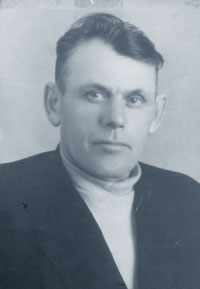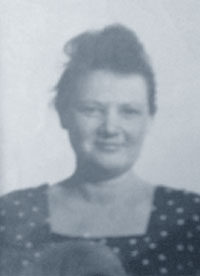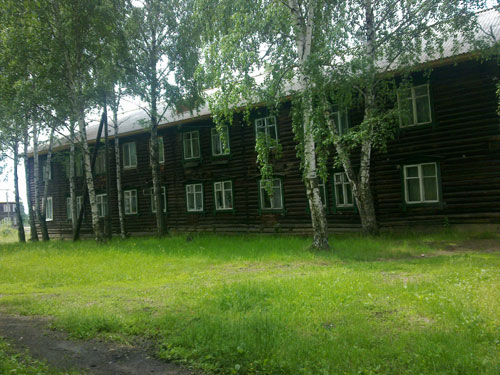









Born in Birilyussy in 1936.
 Parents:
Parents:
Father – Vasiliy Yakovlevich Miusskiy, deported from the Astrakhan Region.
Mother – Maria Filippovna Erich, also dispossessed; deported from the ASSR of
the Volga Germans to the settlement of Polevoe, Biriljussy District.
(Information from the Book in commemoration of the victims of political repressions of the Krasnoyarsk Territory, volume 5: MEUSSKIY (Miusskiy), Vasiliy Yakovlevich: born in the village of Laboyka, Gouvernement of Astrakhan, in 1908. He was the son of a kulak. Lived in the Birilyussy District, Krasnoyarsk Territory for some time. Construction worker and technician with the Birilyussy District Industrial Combine. Arrested on the 25.12.1941. Accused of antisoviet agitation. Sentenced by the Krasnoyarsk regional court on the 25.07.1942 to an 8 years’ detention in a corrective labour camp and a 5 years’ deprivation of all political rights. Rehabilitated by a special commission of the Supreme Court of the RSFSR on the 11.09.1958 (P-10095).
He was sentenced for having given his opinion on some planned construction in Birilyussy: “Why do we need this construction? The Germans are advancing! What nonsense!“. The mother was very competent in sewing curtains and making Richelieu embroidery. During the house search they were confiscated; later they were seen in the procuror’s house. Valya and her sister Toma wore little cat brooches on their caps; while the house search was on, they tried to hide them, for these little cats meant something very near and dear to them. The mother was a good housewife, who always kept everything spick and span. This was because of her German education.
 They had to pay a lot of taxes. When you were keeping chicken, you had to
yield their eggs to the State. If you owned a calf, you were forced to remit
most part of the meat and the skin, as well. Moreover, you were not allowed to
singe the skin, as it was usually done. Once, they set fire to the calf by means
of straw, someone denounced them, and, within an inch, Maria Filippovna had been
mobilised to the trudarmy (the more since her husband was an “enemy of the
people”); she was called a Fascist, people cursed at her. And the calf was
confiscated. She was rescued by Uncle Lyonya, the chairman of the machine and
tractor repairshop.
They had to pay a lot of taxes. When you were keeping chicken, you had to
yield their eggs to the State. If you owned a calf, you were forced to remit
most part of the meat and the skin, as well. Moreover, you were not allowed to
singe the skin, as it was usually done. Once, they set fire to the calf by means
of straw, someone denounced them, and, within an inch, Maria Filippovna had been
mobilised to the trudarmy (the more since her husband was an “enemy of the
people”); she was called a Fascist, people cursed at her. And the calf was
confiscated. She was rescued by Uncle Lyonya, the chairman of the machine and
tractor repairshop.
Her younger sister Lina was deported to join the labour army in Mongolia. This labour army, according to her report, was something really horrible. Later-on, she was lucky: she got married to a Mongolian, a very good soul.
At first Vasiliy Yakovlevich was sentenced to death by a firing squad, but the head of the machine and tractor repairshop did everything in his power to put in a good word for him; thereupon, the death penalty was changed into a 10 years’ detention. He was taken on board a barge; then they deliberately knocked a big hole into the body (as V.V. confirmed), in order to make the barge sink. The father and some other prisoners jumped off the barge and stayed alive. (A.B.: Many people refer to such a case of the sinking of a barge near Yeniseysk; however, this apparently was an accident, after all - in 1942 prisoners were urgently needed for work input in big construction projects; nobody would have drowned them willingly).
Valentina Vasilyevna recalls that in 1941 deported Letts were chased to Polevoe. They were all well-dressed. They arrived in a big formation – on foot. They built themselves dugouts, settled in step by step and got prepared for the future.
Vasiliy Yakovlevith served his sentence in one of the camps in Krasnoyarsk. The mother came to see him there. Later they commuted his sentence due to the good job he had done; hence, he served his time for just 7 years, but after having released from the camp in 1949, they exiled him to Podtyossovo for a period of 5 years and he was forced to regularly getting registered with the commandant’s office. His family left Polovoe and arrived at his place by paddlesteamer; they were guarded during the whole trip. The guard fell in love with Maria Filippovna; V.V. recalls this as a queerish incident.
They built themselves a little house on Koshevoy Street. In Podtyossovo he worked as head of the wood processing combine. He was well-accepted at work, but the Communists behaved quite mistrustful towards him. He died due to an accident in the 62nd year of his life. During the acceptance procedure on one of the ships he slipped on the icy sea ladder, fell down from a high level and broke his spine. He lived on for another two years.

The commandant’s office in Podtyossovo was on Pervomaiskaya-Street N° 3
The commandant’s office in Podtyossovo was on Pervomaiskaya-Street N° 3, in a stretched, two-storeyed building. The commandant’s wife was Maria Filippowna’s friend, their children often played together. The commandant behaved in a very cruel manner towards the exiles, he beat them and even kicked at them. They occupied a big apartment, which was separated into three sections. In one of these sections was his workroom, where he used to interrogate people bawling at them – and everything was heard in the other two sections.
The exiles lived under their peers on Kalinin Street, which was a district of about 10-11 houses.
Many exiled constructing engineers were working for the engineering department of the ship-repair yard: people like Cherbotaryov, Urbel, Voldemar Martinovich, Mikhail Ivanovich (she cannot recall her family names) / Bogdanov (maybe, he was not from among the exiles). She also commemorates the exiled physician Bendig. These people left some big impression, for they were very educated, diligent and intelligent. They never raised their voices against anybody.
The camp in Podtyossovo was organized approximately in 1943-44; prisons were building a dam there.
Nothing is left of the camp nowadays. Houses were constructed in its place – which is the Koshevoy / Kalinin Street district (the part situated nearest to the entrance of the village). They were working at the dam day and night. All experts working for the construction project had been sentenced on §58, among them engineers and former managing directors. During the construction phase stones were transported to the site by horses; then the stones were thrown into the Yenisey.
The supply situation in Podtyossovo was adequate, at least as long as it was under the responsibility of the Norilsk Combine. Vasiliy Yakovlevich received 1500 rubels, which was a lot of money at that time.
When Stalin died, Vasiliy Yakovlevich exclaimed: „Thank God! He kicked the bucket!“. V.V. argued with him at that time (for everybody else had broken into tears), but meanwhile she completely agrees to what he said. He also said to her: “My daughter, now you are quarreling with me, but one fine day you will be thinking of my words“.
Her husband, Viktor Fyodorovich Pyatkov, had been living in Podtyossovo since 1938; in the beginning they lived in dugouts. But they had removed to Podtyossovo on their own will, they had not been deported to this place. Before that time they lived in Predivinsk.
In 1949 or 1950 they confined him for having left the industrial training school (such an educational institution existed with the Yeniseysk ship-repair yard) without authorization. He was sentenced to a four years’ detention, but V.F. was lucky: they finally commuted the sentence to 6 months. Having been released from Yeniseysk prison, they sent him to the camp in Novomaklakovo. There they had the so-called imputation system: if you fulfilled the work norm on 150%, you were imputed three days instead of one, if you managed to reach 127% (A.B. – 125%?) you were imputed two days instead of only one, and when you made less, then one day just remained one day. The were working for the construction project of the wood-processing combine. Notless than 1000 prisoners were kept in the camp, among them many people from Podtyossovo. There were mainly small-time criminals, but practically no dangerous criminals or political prisoners at all. They received a salary, which was reached out to the brigadier.
The interview was taken by Margarita Mukhamedrakhimova.
(AB – Annotations by Aleksei Babiy, Krasnoyarsk „Memorial“ Organization)
Seventh expedition of history and human rights, Podtyossovo, Novotroitskoe, 2010.